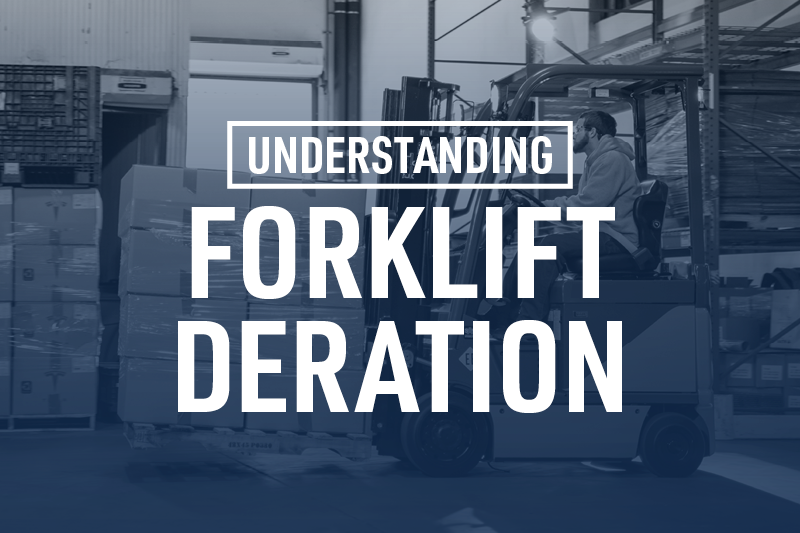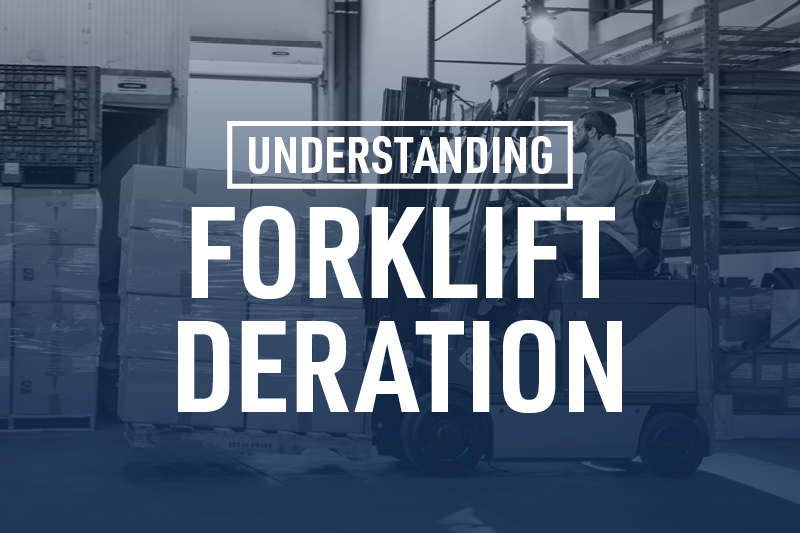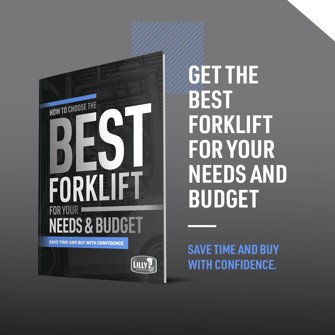

Unfortunately, trying to learn more about forklift deration online is likely to lead you to a lot of hollow results. Most of the time, the resources available provide just a brief definition followed by a formula.
But if you’re here to learn about deration, how it works, and why it’s crucial for keeping your team efficient and your workplace safe, read on!
What is Forklift Deration?
Every forklift comes with a specific rated weight capacity. This might range from 3,000 pounds to 40,000 pounds (or even 70,000 and over for heavy-duty options).
However, just because a forklift is rated for 5,000 pounds doesn’t necessarily mean a 5,000-pound load can be lifted to maximum height. As an example, imagine you’re holding a five-pound weight directly in front of your chest. That isn’t too much of a strain, but as soon as you fully extend your arms outward, the load suddenly places enough pressure on your back and shoulder muscles to make that five-pound weight feel like twelve pounds.
Deration works the same way. And several factors can contribute to lowering the rated weight, but before we cover that, let’s discuss why it’s crucial to understand it.
Why is Understanding Forklift Deration Important?
If you’re reading this, you probably can already guess some of the risks of operating machinery, especially forklifts, beyond their capacity.
We know you’ve seen most of those forklift accident videos. There’s the one where the operator drives right through a bay door or the other one where the operator knocks a crate off of one shelf, and it topples the entire warehouse. Still, you never want incidents like these occurring in your warehouse.
Damaged products are one problem, but a workplace incident is quite another. Putting safety first may sound cliche, but you likely understand better than most how important it is for safe working conditions to be a high priority in your warehouse. Plus, “only loads within the rated capacity of a truck shall be handled” is an OSHA requirement.
On the other hand, you may be underutilizing some of your forklifts out of fear of exceeding their capacity. In other words, you might unknowingly be able to move a heavier load, which means your team can work more efficiently without making your machinery potentially dangerous. For example, if it turns out they can carry twice as much product in a single trip, they can double their efficiency.
Keep reading to learn more about deration and the importance of changes in lift capacity.
What Are Some Factors That Contribute to Deration?
There are a few things that you can contribute to your forklift’s deration, including:
- Length of forks or forklift attachments
- Dimensions of load (the center of the load)
- Height to which load is being lifted
Adding any length onto the end of your forks or modifying them in any way can affect the assigned weight rating, which is only given based on the existing forks. One of the questions that we think is neglected too often by operators (and warehouse owners) is just how much the lifting capacity is affected by attachments. This should absolutely be taken into consideration without exception.
Always be asking: How much is the lifting capacity affected by adding an attachment?
In fact, OSHA requires that, if an attachment is added, written approval from the manufacturer is required (OSHA Standards, 1917.43(e)(3) and 29 CFR 1910.178(a)(4)). We know it seems like a lot, but it could save a life. And if you purchase any type of attachment from us (clamp, rotator, fork extensions, etc.) from us, we’re happy to help you obtain approval and receive the required updated data plate.
The dimensions of the load can affect the rating, as well. Take, for example, a crate with a length that extends far beyond the length of the forks. This crate could effectively tip the forklift over based on its length alone.
Likewise, such a crate may not tip the forklift over until lifted a few feet off the ground. This is why the height to which the load is being raised is another important factor.
How Do You Calculate Your Rating Capacity?
To get your forklift’s capacity, you can contact any supplier, such as the forklift experts at the Lilly Company (844-LILLYCO) (1-844-545-5926), and we’ll be more than happy to help you determine not only your forklift’s factory capacity but also the modified deration capacity.
Need Quick, Expert Help Finding Your Capacity? Or Looking for a New or Like-New Forklift?
If you’re still unsure after looking everything over, please give us a call at 844-LILLYCO (1-844-545-5926), and our experts will be more than happy to help you figure out the best option for you, whether you need a replacement, repair, or otherwise.
At the Lilly Company, we’re experts in helping you find and choose the right forklift for your needs. We are an authorized forklift dealer for Toyota, Clark, Komatsu and Linde, serving customers throughout Alabama, Mississippi, Tennessee, and eastern Arkansas.
Contact a forklift expert at The Lilly Company online or by phone at 844-LILLYCO (1-844-545-5926) with any questions you have, or visit us at one of our 13 locations across the Mid-South:
Arkansas – Jonesboro
Alabama – Birmingham, Dothan, Irondale, Madison, Mobile, and Montgomery
Mississippi – Tupelo, and Richland
Tennessee – Jackson, Memphis, Knoxville, and Kingsport
Further Reading:
Forklift Extensions: What You Need to Know
The Seven Different Kinds of Forklifts (According to OSHA)
Do I Need a Forklift Attachment?
Posts by Tag
- Forklift (61)
- Forklift Service (19)
- Electric Forklifts (16)
- Forklift Safety (14)
- Forklift Attachments (12)
- Toyota Forklifts (12)
- Warehouse Planning (10)
- Parts (9)
- Warehouse Automation (8)
- Clark Forklifts (7)
- Loading Docks (7)
- Material Handling Education (7)
- Pallet Racking (7)
- Customer Solutions (6)
- Forklift Batteries (6)
- Forklift Rental (6)
- Purchasing Options (6)
- Aerial Equipment (5)
- Heavy Equipment (5)
- Forklift Accessories (4)
- Forklift Fleet Management (4)
- Forklift Tires (4)
- Forklift Training (4)
- Products (4)
- Utility Vehicles (4)
- Yard Spotter Trucks (4)
- Linde (3)
- Pallet Jacks (3)
- Specialty Forklifts (3)
- Used Equipment (3)
- IC Forklifts (2)
- Manitou (2)
- Warehouse Doors (2)
- COMBiLift (1)
- Custom Shop (1)
- Forklift Brakes (1)
- Forklift Warranty (1)
- Gehl (1)
- Komatsu (1)
- Product Review (1)
- Recruitment (1)











